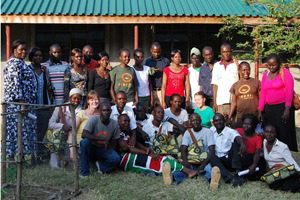The NSF-CNH project aims to inform a broader understanding of links between ecosystem and human health by focusing on the natural resources that provide food. In this Kenyan case, fishery resources have a substantial impact on local people. Poor nutritional status is often integrally linked to degraded fisheries and agro-ecosystems. Fluctuations and declines of food availability, whether driven by seasonal fluctuation, changes in availability, or altered access, can negatively influence long-term human health outcomes. The new PEER project analyzed these relationships, specifically the role of fish use and access in the Lake Victoria fishery of Western Kenya. This study investigated how fishery health shapes human nutrition, livelihoods, and health outcomes. It also aimed to illuminate and predict how human health and household wealth affect household reliance on harvested biodiversity.
In 2012, Organic Health Response completed a highly successful HIV program for the social network groups who would subsequently participate in the nutrition intervention. These groups were established based on existing social networks, and members recruited their families, friends, church groups, fellow fishermen, soccer teams, etc.
Social network groups participated in six curriculum sessions from May 2014 to August 2014. The curriculum was designed to provide knowledge and empowerment, and it emphasized hands-on activities, including cooking and farm demonstrations, dramas, and creating family plans. Community members also made plans to support each other in case of future challenges like grain shortages or child malnutrition. The program structure was designed to drive sustainable behavior change and allow participants to build relationships with Community Health Worker facilitators for ongoing support.
The team continued to follow up with these groups to maintain group engagement, encouraging them to continue meeting, providing additional curriculum, and continuing Community Health Worker training. They also shared technical resources, addressed acute malnutrition referrals, and provided technical support for fishing and agricultural initiatives to improve food access in tandem with the findings from the research project. In this work the team engaged more than 500 individuals and 50 community health workers in 41 social support groups. In total, 40% of families with young children joined the social support groups.
After initial data collection, the PI and his team conducted the 18 and 21 month follow-up surveys within the island community. The U.S.-based partners at UC-Berkeley and Kenyan-based partners at Organic Health Response worked together actively to build a program to support regional households in improved nutrition and food security.
The research team was awarded additional grants, including PATH’s NEEP (Nutrition Evaluation Enhancement Program) grant and The Segal Family Foundation’s Organic Health Response grant. Staff in Kenya participated in research ethics, computing, and other training sessions, and a research certificate program was created. The PEER team also created a connection between students at Sena Primary School on Mfangano Island and Longfellow Middle School in Berkeley, California. A total of 160 students learned about the research program and connected directly with each other through pen pal letters.
PublicationsC.R. Salmen, M.D. Hickey, K.J. Fiorella, D. Omollo, et al. 2015. “Wan Kanyakla” (We are together): community transformation through a social network intervention for HIV care on Mfangano Island, Kenya.
Social Science and Medicine 147: 332-40.
https://doi.org/10.1016/j.socscimed.2015.11.021 K.J. Fiorella, C.S. Camlin, C.R. Salmen, R. Omondi, M.D. Hickey, D.O. Omollo, E.M. Milner, E.A. Bukusi, L.C.H. Fernald, J.S. Brashares. 2015. Transactional Fish-for-Sex Relationships Amid Declining Fish Access in Kenya.
World Development 74: 323-332.
https://doi.org/10.1016/j.worlddev.2015.05.015 J. Nagata, K.J. Fiorella, C.R. Salmen, M.D. Hickey, B. Mattah, R. Magerenge, et al. 2014. Around the table: Food insecurity, socio-economic status, and instrumental social support among women living in a rural Kenyan island community.
Ecology of Food and Nutrition 54(4): 358-69.
https://doi.org/10.1080/03670244.2014.995790
K.J. Fiorella, M.D. Hickey, C.R. Salmen, J.M. Nagata, B. Mattah, R. Magerenge, C.R. Cohen, E.A. Bukusi, J.S. Brashares, L.H. Fernald. 2014. Fishing for Food? Analyzing links between fishing livelihoods and food security around Lake Victoria, Kenya.
Food Security 6(6): 851-860.
https://doi.org/10.1007%2Fs12571-014-0393-x
J.S. Brashares, B. Abrahms, K.J. Fiorella, C.D. Golden, R. Marsh, D.J. McCauley, T. Nunez, K. Seto, L. Withey. 2014. Wildlife Decline and Social Conflict.
Science. 345(6195): 376-378.
https://doi.org/10.1126/science.1256734 K.J. Fiorella. 2013. Interpersonal relationships in research: balancing reciprocity and emergencies. J
ournal of Research Practice 10(2): N1.
https://jrp.icaap.org/index.php/jrp/article/view/398 



